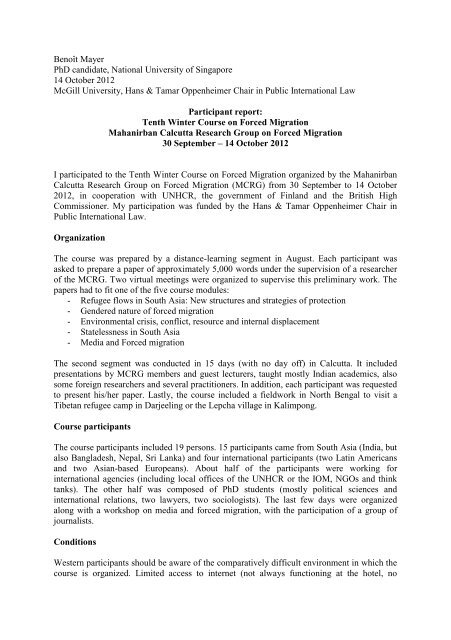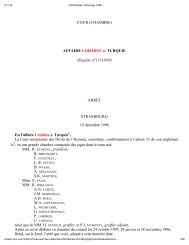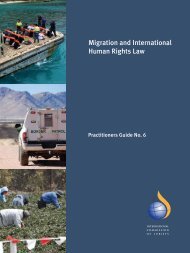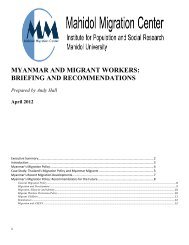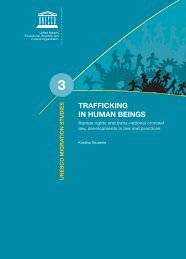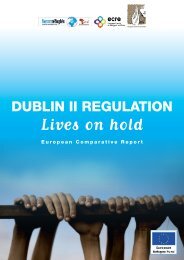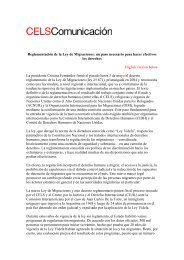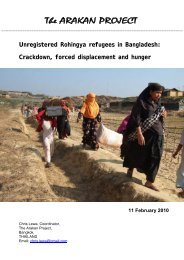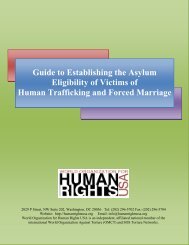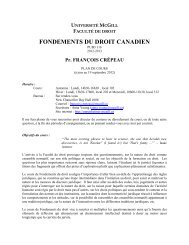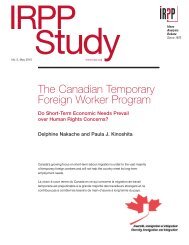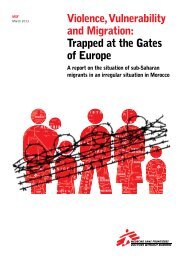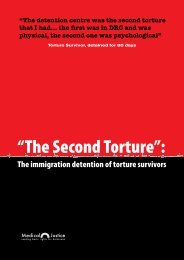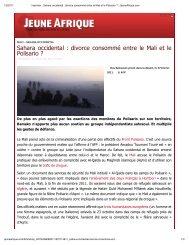Benoît Mayer PhD candidate, National University of Singapore 14 ...
Benoît Mayer PhD candidate, National University of Singapore 14 ...
Benoît Mayer PhD candidate, National University of Singapore 14 ...
You also want an ePaper? Increase the reach of your titles
YUMPU automatically turns print PDFs into web optimized ePapers that Google loves.
Benoît <strong>Mayer</strong><br />
<strong>PhD</strong> <strong>candidate</strong>, <strong>National</strong> <strong>University</strong> <strong>of</strong> <strong>Singapore</strong><br />
<strong>14</strong> October 2012<br />
McGill <strong>University</strong>, Hans & Tamar Oppenheimer Chair in Public International Law<br />
Participant report:<br />
Tenth Winter Course on Forced Migration<br />
Mahanirban Calcutta Research Group on Forced Migration<br />
30 September – <strong>14</strong> October 2012<br />
I participated to the Tenth Winter Course on Forced Migration organized by the Mahanirban<br />
Calcutta Research Group on Forced Migration (MCRG) from 30 September to <strong>14</strong> October<br />
2012, in cooperation with UNHCR, the government <strong>of</strong> Finland and the British High<br />
Commissioner. My participation was funded by the Hans & Tamar Oppenheimer Chair in<br />
Public International Law.<br />
Organization<br />
The course was prepared by a distance-learning segment in August. Each participant was<br />
asked to prepare a paper <strong>of</strong> approximately 5,000 words under the supervision <strong>of</strong> a researcher<br />
<strong>of</strong> the MCRG. Two virtual meetings were organized to supervise this preliminary work. The<br />
papers had to fit one <strong>of</strong> the five course modules:<br />
- Refugee flows in South Asia: New structures and strategies <strong>of</strong> protection<br />
- Gendered nature <strong>of</strong> forced migration<br />
- Environmental crisis, conflict, resource and internal displacement<br />
- Statelessness in South Asia<br />
- Media and Forced migration<br />
The second segment was conducted in 15 days (with no day <strong>of</strong>f) in Calcutta. It included<br />
presentations by MCRG members and guest lecturers, taught mostly Indian academics, also<br />
some foreign researchers and several practitioners. In addition, each participant was requested<br />
to present his/her paper. Lastly, the course included a fieldwork in North Bengal to visit a<br />
Tibetan refugee camp in Darjeeling or the Lepcha village in Kalimpong.<br />
Course participants<br />
The course participants included 19 persons. 15 participants came from South Asia (India, but<br />
also Bangladesh, Nepal, Sri Lanka) and four international participants (two Latin Americans<br />
and two Asian-based Europeans). About half <strong>of</strong> the participants were working for<br />
international agencies (including local <strong>of</strong>fices <strong>of</strong> the UNHCR or the IOM, NGOs and think<br />
tanks). The other half was composed <strong>of</strong> <strong>PhD</strong> students (mostly political sciences and<br />
international relations, two lawyers, two sociologists). The last few days were organized<br />
along with a workshop on media and forced migration, with the participation <strong>of</strong> a group <strong>of</strong><br />
journalists.<br />
Conditions<br />
Western participants should be aware <strong>of</strong> the comparatively difficult environment in which the<br />
course is organized. Limited access to internet (not always functioning at the hotel, no
network at the course venue), constant traffic jams everywhere, and conflicts between Indian<br />
spices and Western stomachs are only some <strong>of</strong> the most colorful examples <strong>of</strong> the difficulties<br />
<strong>of</strong> living – not to speak about studying – in a developing country. However, the excellent<br />
organization <strong>of</strong> the course did mitigate most <strong>of</strong> these difficulties. The participants were all<br />
hosted in a comfortable hotel situated a few hundred meters from the course venue (two<br />
participants per room), yet hot water was not always available. Hygienic and not (so) spicy<br />
food was provided for all meals and very few personal expenses were necessary. The course<br />
is intensive and does not include any day <strong>of</strong>f.<br />
General comments<br />
Not all lectures or participants’ presentations were <strong>of</strong> great interest (certain being unclear or<br />
little informative), but a few were genuinely eye-opening and did entirely justify the whole<br />
course. Generally, as a Western-educated student, I did appreciate to be exposed to very<br />
different perspectives on forced migration studies. These differences <strong>of</strong> perspective included<br />
not only a specific geographical emphasis (South Asia is certainly a relevant region to study<br />
forced migration), but also a constant use <strong>of</strong> what Western academia usually calls ‘critical’<br />
theories – in particular post-colonial theories. Chimni’s work on refugee protection was a<br />
constant reference in every normative debate and it could be a good introduction for Western<br />
participants to the course. I also appreciated to meet researchers with extensive empirical<br />
knowledge <strong>of</strong> regional forced displacement issues.<br />
Overall, the human factor was a significant upside <strong>of</strong> the course, although I sometimes<br />
regretted that there were not more participants this year. The course provided a unique<br />
opportunity to meet local people (lecturers as well as participants), including excellent<br />
researchers, with whom it is generally very difficult to get in touch. The sentiment I had at the<br />
end <strong>of</strong> the course was that <strong>of</strong> two parallel worlds, with excellent Indian researchers not being<br />
included in the universe <strong>of</strong> ‘international’ (i.e. mostly Western) peer-reviewed literature.<br />
More than anything else, the MCRG’s intensive course was a rabbit hole opening the way to<br />
the wonderland <strong>of</strong> the South Asian / Third World research on forced migration.<br />
For further information, I can be contacted by email at bmayer@nus.edu.sg or<br />
benoit.mayer@mail.mcgill.ca .


